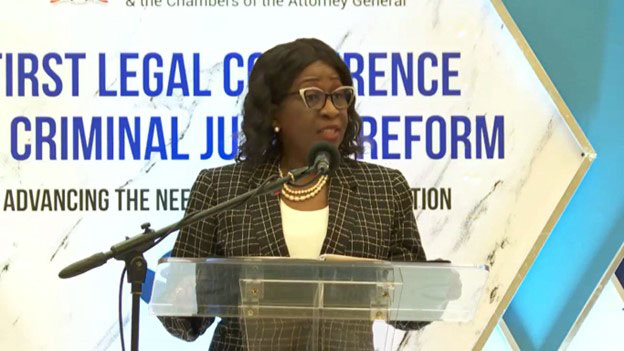Belize’s Chief Justice Louise Blenman yesterday underlined progress that had been made in the criminal justice system of the Central American state following the groundbreaking Needham’s Point Declaration of last year September.
Speaking at the First Legal Conference on Criminal Justice Reform – Advancing the Needham’s Point Declaration at the Marriott Hotel, the Guyana-born Justice Blenman highlighted the transformative impact of the Needham’s Point Declaration, which she said has swiftly become the bedrock of Belize’s legal reforms.
She emphasized the establishment of the Sentencing Guidelines Committee and Sentencing Advisory Committee, pioneering bodies in Belize set to implement comprehensive sentencing standards in the near future.
Audits conducted within Belize’s judicial system exposed alarming deficiencies, with criminal cases lingering for up to twelve years in the High Court and six years in the Appeal Court. Justice Blenman, a former magistrate in Guyana, acknowledged these systemic challenges and stressed the crucial role of collaboration across all sectors of the justice system. Despite lacking direct oversight over independent entities, she underscored the necessity of unified efforts to address these critical issues.
Central to Justice Blenman’s strategy was the creation of the permanent Criminal Justice Board on December 4th, 2023. This inclusive board integrates diverse stakeholders—clergy, forensic experts, educators, healthcare professionals, prosecutors, defence attorneys, prison officials, and social workers—to foster dialogue and shared responsibility. Their collective aim is to expedite justice delivery and rebuild trust among stakeholders.
High Court judges chaired several subcommittees, collaborating with key figures such as the Director of Public Prosecutions and defence counsel. Their task: to identify and address barriers contributing to case backlogs, which include excessive pretrial detention and frequent adjournments. Through comprehensive case management training, judges now facilitate streamlined criminal trials, promoting efficiency and reducing adversarial practices.
Efforts to integrate old and new cases in court proceedings have significantly reduced average case ages in both the High Court and the Appeal Court to approximately four years.
Justice Blenman also highlighted legislative strides, notably the enactment of the Criminal Procedure (Plea Discussion and Plea Agreement) Act, which complements enhanced judicial training and procedural reforms. These measures have expedited case resolutions and alleviated courtroom congestion.
Addressing concerns over pretrial detention, Justice Blenman championed expanded bail hearing accessibility as a pivotal reform. This initiative has significantly reduced prolonged detention periods, fostering a more equitable justice system and contributing to a decline in the remand population.
Justice Blenman reiterated her commitment to the principles of the Needham’s Point Declaration, foreseeing sustained progress towards a fair, efficient, and transparent justice system in Belize.
From 18-20 October 2023, Prime Ministers, Attorneys-General, Ministers of National Security, Heads of Judiciaries, judicial officers, Directors of Public Prosecution, Commissioners of Police, Commissioners of Prisons, criminal defence attorneys, law students, and members of civil society from across the region convened at the Hilton Barbados Resort, in Needham’s Point, Bridgetown, Barbados for the Caribbean Court of Justice’s Academy for Law’s 7th Biennial Conference. Themed “Criminal Justice Reform in the Caribbean: Achieving a Modern Criminal Justice System”, the Conference aimed to effect improvements in the criminal justice systems in the Caribbean by bringing together stakeholders to develop practical solutions to address the issues impacting criminal justice. A Declaration embodying experiences, best practices and recommended action was adopted by the participants as a commitment to improving criminal justice.









